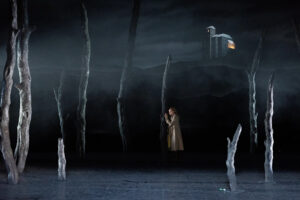
Opera Profile: Franz Schreker’s ‘Irrelohe’
By John Vandevert(Photo Credit: Opéra de Lyon)
“Irrelohe” is the sixth opera of 20th-century Austrian composer Franz Schreker, begun in 1919 and premiered shortly after in 1924 at the Stadttheater Köln. Coming right after Schreker’s then latest opera, Der Schatzgräber. The opera is a three-act opera about the tribulations of love and sacrifice. This was a poignant theme for him, as during Hitler’s fascist rule he was censored and his music banned from performance under the title of “Entarte Musik” (Degenerate Art).
Schreker, much like other interim composers between Romanticism and Impressionism/Neo-classicism, involved both experimental and traditional elements in their musical works. For Schreker, he was influenced by Schoenberg’s serialist techniques but also Wagner’s thick and dramatic textures, as well as composers like Paul Hindemith, member of the movement called “New Objectivity.” Thus, his music incorporated emotions and emotional longing into an expressionist and wholly intellectual worldview.
The opera was performed at the famous Bielefeld Opera during its life from 1980 to 1998, and has been brought into the present thanks to the work of Opéra de Lyon, including it in their 2021/2022 season. While not universally known, nor the most well-known by Schreker, that title being given to his opera, “Der ferne Klang“ and his last opera, “Der Schmied von Gent,” the opera has proven to be an interesting shake up for opera houses around the globe.
The Story
The opera is structured into three acts and takes place in the 18th-century mythical castle of Irrelohe. Named after the Irrenlohe train station in Bavaria, Germany, known as a transport hub for shells during WWII for Hitler’s forces, the opera centers on the relation between Eva and Peter, son of Lola.
In Act one, Peter and Lola are talking to each other and Peter expresses interest in the castle on the hill, Irrenlohe. The castle, however, is cursed, and any man who lives there is bound to sexually assault a woman. Peter now desires to not only visit the mysterious place but know who his unknown father is. Soon enough, Peter learns that his mother was a woman who was attacked by the Count in the castle and his father is none other than Count Heinrich. He cannot bring himself to tell his love, Eva, this as she’s drawn magically towards the castle.
During Act two, Eva’s father, a Miller, has his mill burned down during the night. This is a yearly occurrence, and it’s found out that Lola’s former husband Christobald travels with his musician friends Fünkchen, Ratzekahl and Strahlbusch and sets fires while they work. Eva is further drawn to the castle but Heinrich, now returned, will not allow himself to become mad and will not touch Eva until she is married to him.
The final act concludes these threads. On the day of the wedding, Eva tries to convince Peter that splitting is best. The madness is coming over Peter and he begs his mother not to leave him unchained. However, he becomes mad and tries to attack Eva, only to be killed by Christobald who sets the castle on fire. While shocked, Heinrich and Eva look towards their new life together.
Listen
Categories
Opera Wiki

